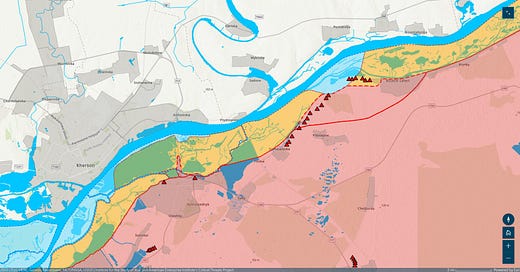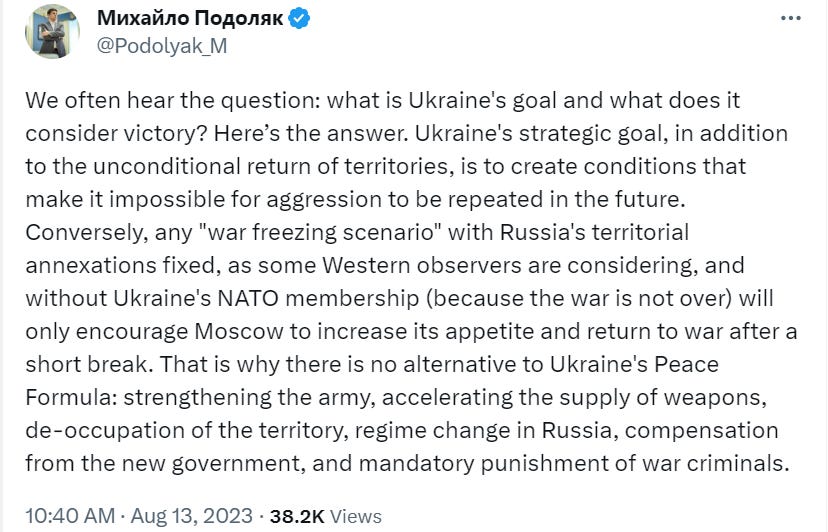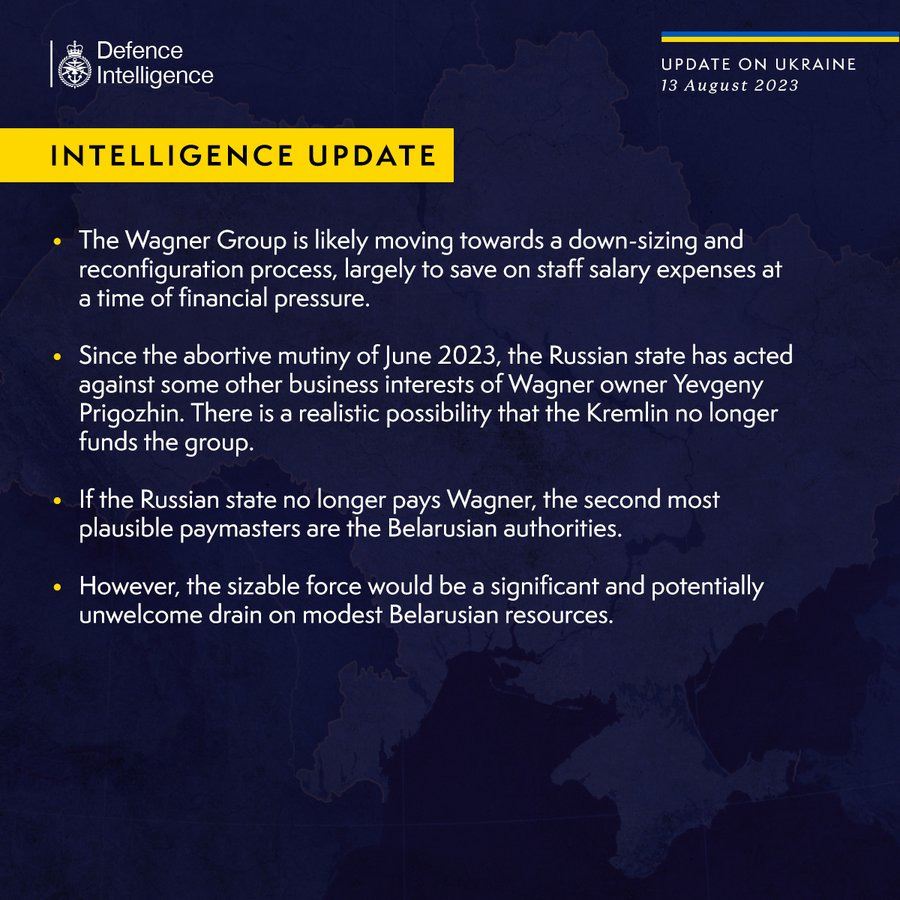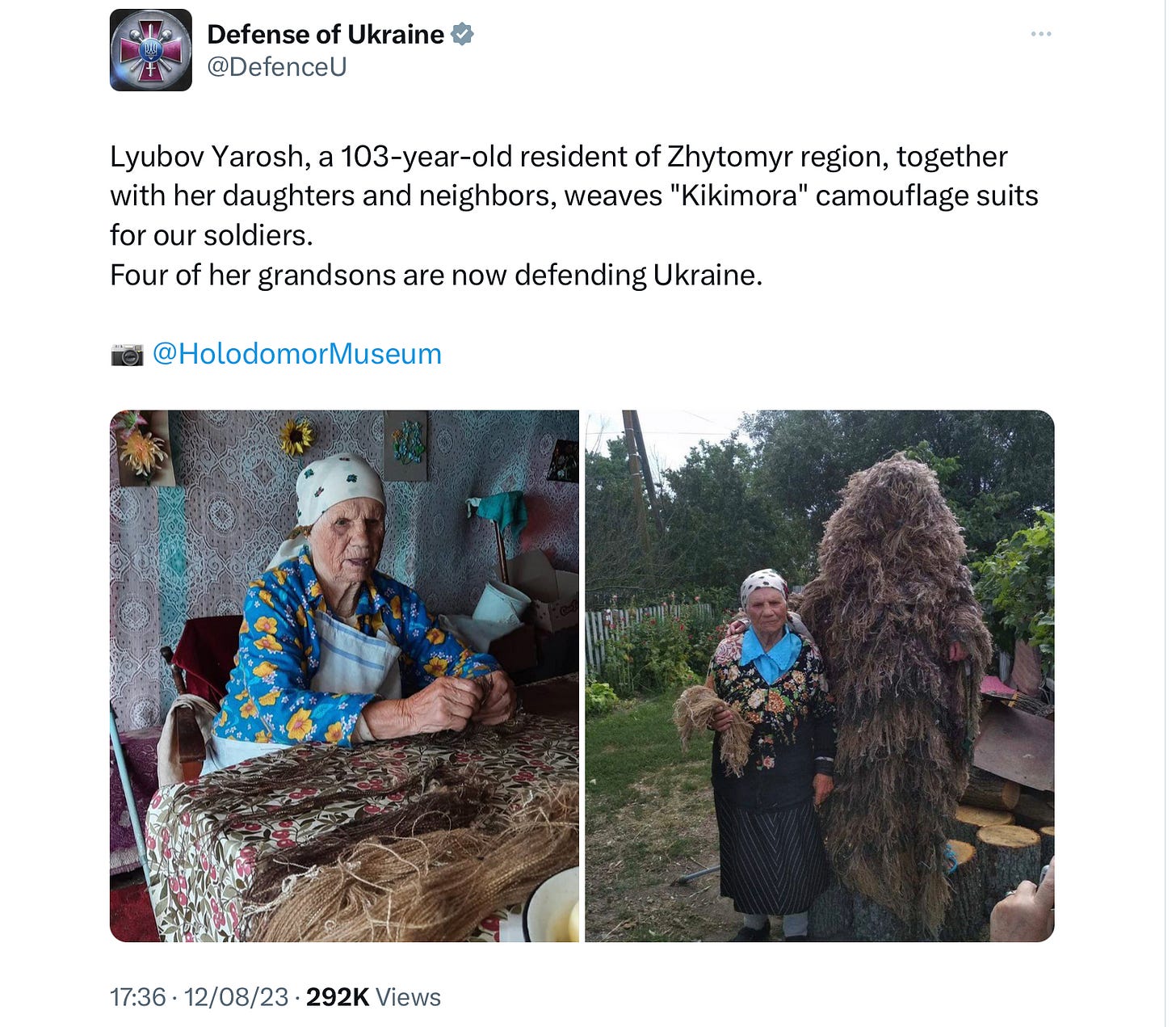Aug 14: E-Stories
Day 536 Kherson UASitRep RUSitRep Moscow Mariupol Dnipro BlackSea Ruble Disertion Shahed Usmanov RUpolling LifeinDonbas A&P UKDef Kapparov Podolyak Carrer KITerajima ISW
Catching up…
EA Worldview’s Ukraine Up-date- hop over to Scott’s amazing hourly Ukraine up-date page. I’ll fill in with some bits and bobs.
Stories we’re following…
Russian forces fired on Kherson Oblast at Shyroka Balka and Stanislav on the morning of 13 August, Andrii Yermak, Head of the President’s Office reports. In Shyroka Balka a complete family was killed, a 12-year old boy survived the attack. Doctors are fighting for his life. In Stanislav a 71 and 57 year old were killed, another woman suffered minor injuries.
President Zelenskyy’s evening speech
Today, the Russian occupiers brutally struck the Kherson region. There are dead, there are wounded.
In total, only from the beginning of this day until six in the evening, there have already been 17 reports of shelling in the Kherson region alone. And also - Mykolaiv Oblast, Zaporizhzhia, Donbas, Kharkiv Oblast, the border with Russia in the northeastern regions.
Ukrainians advance 16-20 kilometers in 'tactically significant' move. Ukraine made a "tactically significant" advance along two lines of attack towards the southern coast, according to the Russian and Ukrainian sources.
Ukrainian forces entrench near Robotyne, conduct counter-battery fire. Ukrainian forces had "partial success" around Robotyne in Zaporizhzhia Oblast, fortifying the territory they liberated and conducting counter-battery fire, according to the General Staff.
On the night of August 13, the Armed Forces of Ukraine destroyed two depots of Russian ammunition in the occupied city of Alyoshki on the left bank of the Dnieper in the Kherson region. This was reported by the speaker of the operational command "South" Vladislav Nazarov.
Russian media: Massive fire breaks out at warehouse near Moscow. A fire broke out at an industrial warehouse in Ramenskoye, Russia, a town around 50 kilometers southeast of Moscow, Russian media and Telegram channels claimed on Aug. 13. Photos and videos shared on social media appeared to showed a massive column of smoke over the site.
Petro Andriushchenko, adviser to the mayor of Mariupol, has said that the partisans destroyed the Russian base in the city, Andriushchenko reports on Telegram. Overnight on 13 August, two storage points of Russian military ammunition were destroyed in occupied Oleshky, Kherson Oblast. Vladimir Rogov, a representative of the Russian-appointed "administration" of the annexed part of the Zaporozhye region, confirms the information about the explosion , without giving additional details.
“The Ukrainian Armed Forces are excavating 5 mines for every m2, installed by Russian troops in order to disrupt Ukraine's counteroffensive,” Ukrainian minister of defense Oleksii Reznikov said.
Malyar calls for calm about news concerning Ukrainian attack across Dnipro on Saturday. Deputy Defense Minister Hanna Maliar sought to tamp down speculations about a Ukrainian raid across the Dnipro River in Kherson Oblast. "There are no reasons for excitement. I just returned from those places," Maliar wrote. "Yes, certain units performed a certain task there," she added.
ISW: Russian milbloggers acknowledged that Ukrainian forces are maintaining a presence on the east (left) bank of the Dnipro River in Kherson Oblast in contrast to previous raids, but ISW does not yet assess that these positions constitute a bridgehead.
The Russian military opened warning fire to stop a foreign cargo ship in the Black Sea.
The Ministry of Defense of the Russian Federation reports that the incident occurred on August 13 at about 6:40 Moscow time in the southwestern part of the Black Sea.
The patrol ship of the Black Sea Fleet "Vasily Bykov" found the cargo ship "Sukra Okan" under the flag of Palau, which was heading to the Ukrainian port of Izmail and "did not respond to the demand to stop for inspection for the transport of prohibited goods."
The number of Russian desertions in Ukraine is increasing, the general staff of Ukraine’s armed forces said. Russian military patrols and military personnel have been going door-to-door searching for deserting servicemen in the Russian-occupied settlement of Hornostaivka in the Kherson oblast. “The occupants are leaving their places of service and trying to hide in abandoned buildings,” the general staff said in its morning update.
Russia is now producing Iranian drones on its own, having changed some of their components and structure – Conflict Armament Research. According to analysts, the interior of the body has lost the so-called "bee" structure, meaning that the drone has become simpler inside. It is noted that experts have found more than 100 components from 22 different companies based in 7 countries, including China, Switzerland and the United States.
Billionaire Alisher Usmanov has filed a complaint with the German Constitutional Court over searches on the Dilbar yacht in the port of Bremen. According to Die Welt, the oligarch considers the yacht a residence that is protected by the constitution. Usmanov is included in the EU, US and UK sanctions lists. In September 2022, the German police carried out a series of searches at facilities associated with him: they took place in four federal states at 24 facilities. 250 people participated in the special operation. According to investigators, the billionaire paid for the protection of his property, although he was forbidden to use the frozen funds.
Up to 74% of Russians would approve the war ending tomorrow and would return occupied territories if propaganda says so, but have no awareness of responsibility for the damage inflicted in Ukraine.
WaPo: A first group of six Ukrainian pilots is not expected to complete training on the U.S.-made F-16 before next summer, senior Ukrainian government and military officials said, following a series of delays by Western partners in implementing an instruction program for the sophisticated fighter jet.
Media: Germany's Rheinmetall to deliver Luna drone system to Ukraine. Rheinmetall, Germany's automotive and arms manufacturer, will deliver a Luna New Generation drone system to Ukraine by the end of 2023, Bild am Sonntag reported on Aug. 12, citing company sources.
Interview with Asami Terajima
The interview is dedicated to civilian life in Donbas amidst everyday Russian attacks. Terajima is a front line war journalist and please give her a follow.
Grabriele Carrer: Italian spy stories
On Valentine’s Day forty years ago, Italian authorities arrested Azeglio Negrino, 45, a Genoese engineer, and Viktor Pronin, 46, a KGB operative under the cover of a senior executive of the Soviet airline Aeroflot, as they exchanged materials “of great strategic importance”.
Negrino was a partner and executive of Microlito, a company in Recco, near Genoa, which had been awarded a contract to reorganize the microfilm process used by the Italian air force.
The exchange between Negrino and Pronin concerned information about the new Tornado military planes being built for NATO by a consortium of Italian, British, and West German companies.
It also included navigation systems, data display and recording subsystems, defensive aid subsystems, and weapon targeting radars.
A few hours after the arrest of Negrino and Pronin, Victor Koniaev, 38 years old, originally from Moscow but residing in Rome for a year and the deputy director of the brokerage company Nafta-Italy, was also arrested.
All three were charged with political-military espionage and faced potential life imprisonment.
Nafta-Italy company dealt with intermediation for purchasing crude oil and petroleum derivatives and had been founded four years prior. Both the president and director were Soviets, like Koniaev.
Investigators suspected that millions of Italian lire (around one hundred million) had been funnelled out of this company’s accounts, which were then transferred by Soviet intelligence to the Genoese industrialist over one and a half years in exchange for strategic materials.
Negrino communicated with Pronin using a device called a “Teledrin,” a pager similar to those used by doctors for urgent communication.
The exchanges of documents and information took place in a shop in the centre of Rome, a photography store owned by Umberto Cantoni.
Negrino travelled from Genoa with the microfilms, arrived in the capital, and left a bag with the requested material in the store. Before leaving, he took an identical bag containing a series of encrypted messages left by Pronin.
The spy story ended on February 14th, 1983, when the Genoese industrialist was arrested by SISMI (Military Intelligence and Security Service) officers as he exited the photography store leaving behind a bag containing around 40,000 pages of microfilmed documents.
This marked the end of a one-year operation conducted by Carabinieri and SISMI officials.
Cantoni helped dismantling the espionage network. He had been contacted by the Soviets in 1978 and asked to use his store as a dead-drop. He alerted service agents, who set the trap after investigations and surveillance.
Negrino was sentenced to six years in prison. He was found guilty of distributing photographic copies (microfilms and microfiches) of classified documents, to which he had access as a partner and executive of Microlito.
Pronin was sentenced to five years and six months in prison but had already returned to his homeland.
The verdict stated, “By engaging in operations related to the receipt of material, the exchange of bags mentioned above, and the retrieval of the material itself, he carried out acts that were clear and unambiguous in their intent for military espionage.”
Italian mathematician Piergiorgio Odifreddi was also involved in the story. He was in the Soviet Union for study purposes and was detained for several months.
As Odifreddi recounts in his book “La Repubblica dei numeri,” the Soviet Union detained him in Siberia as well as two other Italians – journalist Il Giorno’s Luigi Vismara and businessman Michelangelo Mazzarelli – in Moscow.
Odifreddi recounts being sentenced to 14 years for “anti-Soviet activities.” After a diplomatic intervention by the Minister of Foreign Affairs, Giulio Andreotti, and President Sandro Pertini, the three Italians were released after six months in exchange for the Soviet spy.
As for Victor Koniaev, the judges found the evidence collected against him by the prosecution to be insufficient.












